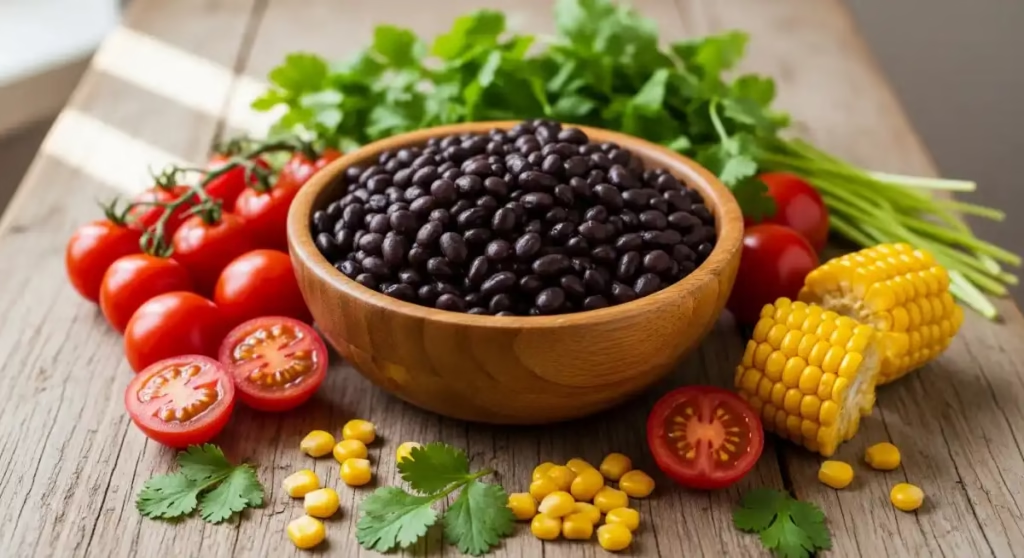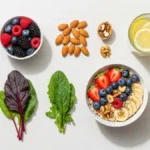Introduction
Among the healthiest and most affordable foods, beans have always been a staple in diets around the world. One variety that stands out for its flavor, texture, and nutrition is the black bean. These small, shiny pulses are rich in plant-based protein, dietary fiber, and essential vitamins. From supporting digestion to improving heart health, they offer numerous wellness benefits.
What Are Black Beans?
Often referred to as turtle beans, this variety is a member of the legume family. They have been cultivated for centuries in South and Central America and remain a cornerstone of Latin cuisine. With their dense, meaty texture and earthy taste, they’re widely used in soups, salads, burritos, and rice dishes.
Nutritional Value
These legumes are low in fat but packed with protein, fiber, and antioxidants. A single cup of cooked beans delivers a powerful dose of nutrition.
Nutritional Profile (1 Cup, 172g Cooked):
| Nutrient | Amount | % Daily Value (DV) |
|---|---|---|
| Calories | 227 | — |
| Protein | 15 g | 30% |
| Carbohydrates | 40 g | 13% |
| Fiber | 15 g | 60% |
| Fat | 0.9 g | 1% |
| Folate | 256 mcg | 64% |
| Iron | 3.6 mg | 20% |
| Magnesium | 120 mg | 30% |
| Potassium | 611 mg | 17% |
👉 Quick fact: A serving provides nearly a third of your daily protein requirement, making them perfect for vegetarians and vegans.
Health Benefits
1. Promotes Digestive Health
High fiber content supports bowel regularity, prevents constipation, and fuels beneficial gut bacteria.
2. Helps With Weight Management
The combination of protein and complex carbohydrates helps you stay full longer, curbing unnecessary snacking.
3. Supports Heart Health
Nutrients like potassium, magnesium, and soluble fiber lower blood pressure, improve cholesterol levels, and reduce cardiovascular risk.
4. Manages Blood Sugar
Because they are low on the glycemic index, these pulses release glucose slowly, helping maintain steady blood sugar levels.
5. Strengthens Bones
Magnesium, iron, and calcium work together to promote strong, healthy bones.
6. Provides Antioxidants
The dark skin of this bean variety contains anthocyanins—powerful antioxidants that fight inflammation and free radical damage.
Role in Weight Loss
For people aiming to shed extra pounds, these beans are a smart addition to the diet. Their fiber helps control appetite, while plant-based protein promotes lean muscle maintenance. Swapping meat with bean-based dishes can reduce calorie intake without compromising on satiety.
Benefits for Diabetes
Diabetics benefit greatly from these legumes because:
- Their slow-digesting carbs prevent blood sugar spikes.
- Fiber helps regulate insulin response.
- Studies show frequent legume intake improves glycemic control.
Impact on Heart Health
Eating them several times a week may significantly reduce the risk of heart disease. Fiber reduces LDL cholesterol, potassium helps regulate blood pressure, and antioxidants protect arteries from inflammation.
How to Cook Black Beans
Cooking Dried Beans
- Soak overnight in water.
- Drain, rinse, and boil for 60–90 minutes until tender.
Using Canned Beans
- Drain the liquid.
- Rinse to remove excess sodium.
- Add directly to recipes.
Tasty Ways to Enjoy Them
🌮 Tacos
Fill tortillas with beans, avocado, salsa, and veggies.
🥗 Fresh Salad
Mix beans with corn, tomatoes, cucumbers, and lime juice.
🍲 Soup
Simmer with onions, garlic, and spices for a hearty meal.
🍔 Veggie Burger
Mash beans with oats and spices to form protein-rich patties.
🍚 Classic Rice & Beans
A Latin American favorite combining carbs and protein in one dish.
Tips for Adding Them to Your Diet
- Blend into smoothies for extra protein.
- Use as a topping for baked potatoes.
- Add to quinoa or brown rice bowls.
- Mash into dips with olive oil and garlic.
Possible Side Effects of Black Beans
- Gas and bloating: Common with high-fiber foods.
- Phytic acid: Can slightly reduce mineral absorption, but soaking reduces this effect.
👉 Start with small servings if you’re new to high-fiber foods.
Frequently Asked Questions
1. Are they good for weight loss?
Yes. High in protein and fiber, they keep you full longer and support calorie control.
2. Can diabetics eat them?
Absolutely. Their low GI helps regulate blood sugar effectively.
3. Do they cause gas?
Sometimes, but soaking and rinsing reduces this issue.
4. How often should I eat them?
2–4 servings per week is ideal for most people.
5. Are they healthier than other beans?
All beans are nutritious, but this variety is especially high in antioxidants.
Conclusion
Black beans are not just a flavorful ingredient—they’re a nutrition-packed food that supports heart health, digestion, weight control, and blood sugar stability. Affordable, versatile, and loaded with plant-based protein, they deserve a spot in everyone’s diet.
From soups and salads to tacos and burgers, the possibilities are endless. By making these beans a regular part of your meals, you’ll enjoy delicious food while giving your body the nutrients it needs to thrive.







